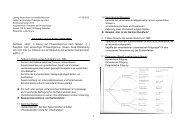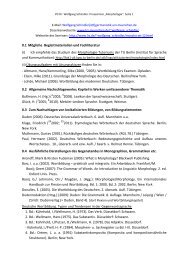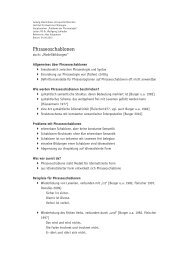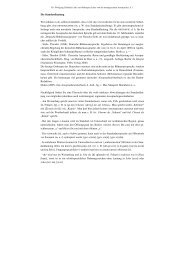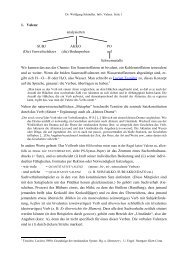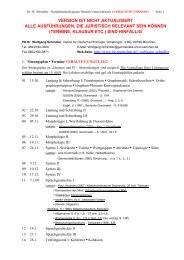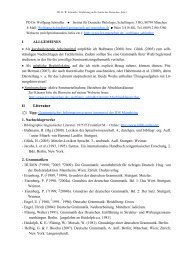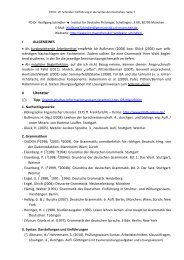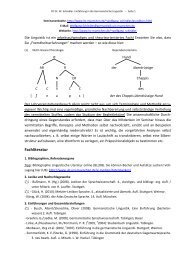Chapter 18 Lexical Functions: Description of Lexical Relations in a ...
Chapter 18 Lexical Functions: Description of Lexical Relations in a ...
Chapter 18 Lexical Functions: Description of Lexical Relations in a ...
Create successful ePaper yourself
Turn your PDF publications into a flip-book with our unique Google optimized e-Paper software.
—<strong>Chapter</strong> <strong>18</strong>. <strong>Lexical</strong> <strong>Functions</strong>— 29<br />
The lexicographic def<strong>in</strong>ition <strong>of</strong> a richer synonym <strong>of</strong> L <strong>in</strong>cludes L’s mean<strong>in</strong>g, so that if L1 =<br />
Syn ⊃ (L2), then (L1) ⊃ (L2). Syn ⊃ (L) logically entails L, but not vice versa, while Syn ⊂ (L) is<br />
logically entailed by L, but not vice versa.<br />
NB: Syn ⊃ and Syn ⊂ are reciprocally <strong>in</strong>verse. Thus, if Syn ⊃ (L1) = L2, then L1 = Syn ⊂ (L2).<br />
Examples<br />
Syn(helicopter) = chopper, copter<br />
Syn(policeman) = cop<br />
Syn(telephoneV) = phoneV<br />
Syn(heart) = ticker<br />
Syn(standard) = garden-variety<br />
Syn(stopV [N]) = pull the plug [on N]<br />
Syn ⊃ (fireV [upon N]) = shellV [N] [shellV [N] entails fireV [upon N], but not vice versa]<br />
Syn ⊂ (break away) = escapeV [break away entails escapeV, but not vice versa]<br />
Syn ∩ (escapeV) = elude, avoid<br />
Syn ∩ (kick the bucket) = bite the dust<br />
Remarks<br />
• <strong>Lexical</strong> synonymy is considered <strong>in</strong> MTT with respect to specific lexicographic senses only,<br />
i.e., with respect to separate LUs. Therefore, as stated above, all LUs <strong>in</strong> our examples should<br />
carry dist<strong>in</strong>guish<strong>in</strong>g lexicographic numbers; this is not done for simplicity’s sake.<br />
• <strong>Lexical</strong> synonymy is considered with respect to mean<strong>in</strong>g only, the differences <strong>in</strong> distribution<br />
and style/register be<strong>in</strong>g immaterial from this stand; they are taken care <strong>of</strong> <strong>in</strong> the lexical entries <strong>of</strong><br />
synonyms. TICKER is an absolute synonym <strong>of</strong> HEART, <strong>in</strong> spite <strong>of</strong> the fact that the former is a<br />
slang expression, while the latter, a neutral term.<br />
• It is generally assumed that absolute synonymy—like Fr. VÉLO (bike) ~ BICYCLETTE (bike),<br />
or BICYCLE ~ BIKE—is rare. This is true, but its rarity should not be exaggerated: the number <strong>of</strong><br />
absolute synonyms <strong>in</strong> a ‘standard average’ European language is about a few hundred. 9 However,<br />
it is true that approximate synonymy is by far more important <strong>in</strong> human languages and, as a<br />
consequence, quasi-synonyms are much more widespread.<br />
• Quasi-synonyms must be neutralizable <strong>in</strong> at least some contexts. For <strong>in</strong>stance, LUs CAR and<br />
VEHICLE are quasi-synonyms because <strong>in</strong> some contexts one <strong>of</strong> them can be used <strong>in</strong>stead <strong>of</strong> the<br />
other: The police chased the blue car throughout Manhattan, but the vehicle disappeared.<br />
WEAPON is a Syn ⊂ <strong>of</strong> GUN, while FIREARM is not, because the former, but not the latter, can<br />
anaphorically replace GUN <strong>in</strong> texts: Lucky Joe pulled his gun, but the sheriff wrestled the weapon<br />
〈*the firearm〉 from him; The crim<strong>in</strong>al had two weapons 〈*two firearms〉 hidden <strong>in</strong> his socks.


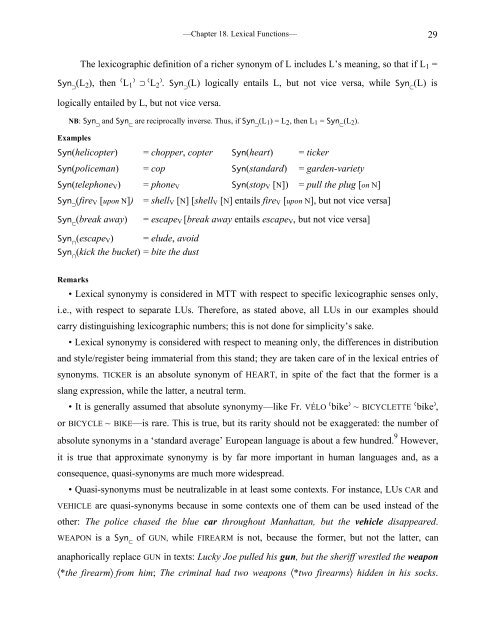
![E-Mail: Wolfgang.Schindler[ätt]germanistik.uni-muenchen.de Web ...](https://img.yumpu.com/51590147/1/184x260/e-mail-wolfgangschindlerattgermanistikuni-muenchende-web-.jpg?quality=85)
